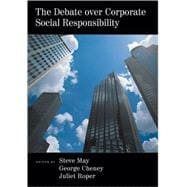
Note: Supplemental materials are not guaranteed with Rental or Used book purchases.
Purchase Benefits
Looking to rent a book? Rent The Debate over Corporate Social Responsibility [ISBN: 9780195178838] for the semester, quarter, and short term or search our site for other textbooks by May, Steven K.; Cheney, George; Roper, Juliet. Renting a textbook can save you up to 90% from the cost of buying.
| Foreword | p. v |
| Contributors | p. xiii |
| Overview | p. 3 |
| Introduction | |
| Why Corporate Social Responsibility: Why Now? How? | p. 15 |
| A New Generation of Global Corporate Social Responsibility | p. 30 |
| Progressing from Corporate Social Responsibility to Brand Integrity | p. 45 |
| Cases and Contexts | |
| Facing Corporate Power | p. 59 |
| Corporate Citizenship: The Dark-Side Paradoxes of Success | p. 74 |
| Corporate Social Responsibility in Scandinavia: A Turn Toward the Business Case? | p. 87 |
| Corporate Social Responsibility in Asia: A Confucian Context | p. 105 |
| Corporate Social Responsibility and Public Relations: Perceptions and Practices in Singapore | p. 119 |
| Corporate Social Responsibility in Mexico: An Approximation from the Point of View of Communication | p. 135 |
| Legal Perspectives | |
| Legal Versus Ethical Arguments: Contexts for Corporate Social Responsibility | p. 155 |
| Corporate Deception and Fraud: The Case for an Ethical Apologia | p. 167 |
| Regulation: Government, Business, and the Self in the United States | p. 177 |
| Can Corporate Personhood Be Socially Responsible? | p. 190 |
| Economic Perspectives | |
| How to Read Milton Friedman: Corporate Social Responsibility and Today's Capitalisms | p. 207 |
| Corporate Social Responsibility as Oxymoron: Universalization and Exploitation at Boeing | p. 219 |
| Toward an Accounting for Sustainability: A New Zealand View | p. 232 |
| Consumer Activism and Corporate Social Responsibility: How Strong a Connection? | p. 241 |
| Social Perspectives | |
| Corporate Governance, Corporate Social Responsibility, and Communication | p. 267 |
| Corporate and Institutional Responses to the Challenge of HIV/AIDS: The Case of South Africa | p. 279 |
| Business, Society, and Impacts on Indigenous Peoples | p. 292 |
| Activism, Risk, and Communicational Politics: Nike and the Sweatshop Problem | p. 305 |
| Environmental Perspectives | |
| Corporate Environmentalism | p. 321 |
| Greening of Corporations? Eco-talk and the Emerging Social Imaginary of Sustainable Development | p. 336 |
| Discourses of Sustainability in Today's Public Sphere | p. 351 |
| Green Marketing and Advertising | p. 365 |
| Sustainable Development Discourse and the Global Economy: Promoting Responsibility, Containing Change | p. 379 |
| The Behavior of Corporate Species in Ecosystems and Their Roles in Environmental Change | p. 391 |
| Commentary on Corporate Social Responsibility: The Contributions of Communication and Other Perspectives | |
| Is Sustainability Sustainable? Corporate Social Responsibility, Sustainable Business, and Management Fashion | p. 405 |
| Corporate Social Responsibility and Public Policy Making | p. 417 |
| The Case of the Subaltern Public: A Postcolonial Investigation of Corporate Social Responsibility's (O)Missions | p. 438 |
| The Discourse of Corporate Social Responsibility: Postmodern Remarks | p. 448 |
| Corporate Social Responsibility/Corporate Moral Responsibility: Is There a Difference and the Difference It Makes | p. 459 |
| Index | p. 475 |
| Table of Contents provided by Ingram. All Rights Reserved. |
The New copy of this book will include any supplemental materials advertised. Please check the title of the book to determine if it should include any access cards, study guides, lab manuals, CDs, etc.
The Used, Rental and eBook copies of this book are not guaranteed to include any supplemental materials. Typically, only the book itself is included. This is true even if the title states it includes any access cards, study guides, lab manuals, CDs, etc.